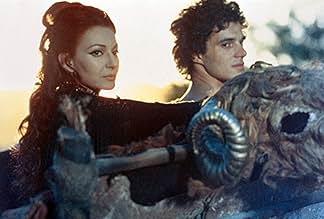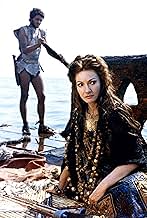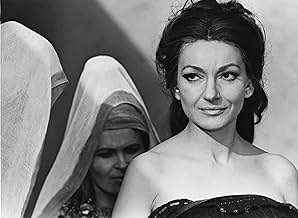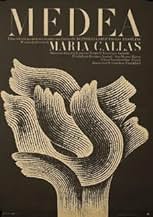NOTE IMDb
6,9/10
5,9 k
MA NOTE
Après avoir récupéré la Toison d'Or, Jason retourne en Grèce avec la puissante magicienne, Médée. Mais lorsque le Roi l'exile, Médée, furieuse, ourdit un plan pour se venger.Après avoir récupéré la Toison d'Or, Jason retourne en Grèce avec la puissante magicienne, Médée. Mais lorsque le Roi l'exile, Médée, furieuse, ourdit un plan pour se venger.Après avoir récupéré la Toison d'Or, Jason retourne en Grèce avec la puissante magicienne, Médée. Mais lorsque le Roi l'exile, Médée, furieuse, ourdit un plan pour se venger.
- Réalisation
- Scénario
- Casting principal
- Récompenses
- 2 nominations au total
Margareth Clémenti
- Glauce
- (as Margareth Clementi)
Annamaria Chio
- Wet-nurse
- (as Anna Maria Chio)
Avis à la une
10Damo-2
Medea is an extraordinary film which some will find difficult. Telling the story of Jason and his quest for the Golden Fleece, this is not the stuff of Ray Harryhausen. Meeting the priestess of the Fleece, Medea, he falls in love with her and takes her home. Years later, after bearing him sons, she exacts a terrible revenge after he spurns her for a new love. Medea is also extraordinary in exhibiting Pasolini's demonstration of contrasts in plot development and framing. In the sequence in which we are introduced to Medea, we witness the mesmeric nature of a human sacrifice, which changes from the ecstatic to the horrific within the same sequence. This motif recurs throughout the film, and has prompted admiration from French philosopher Gilles Deleuze, who mentions Pasolini in his treatise on the movement-image. Filmed with a mixture of professional and non-professional actors, Medea is a challenging and refreshing change from the usual, as it builds up to a frightening climax in an unconventional way. Often shown in 'World Cinema' slots late at night, it's a film worth staying up for, or recording, for those seeking an alternative to Hollywood pap.
I first saw Medea in college and was highly critical of it, finding it disappointing on almost all counts: terrible sound editing, cheap film stock, over bright lighting, bizarre, amateurish acting styles, inadequately edited, etc. Then there was the extended murder scene of Glauce and Creon going seemingly on forever, and then . . . wait; what's this? It's repeated all over again? Did someone get the wrong reel into the house?
Another ten years went by before I watched it again and after the second viewing, found myself emotionally drained, my jaw on the floor with the realization that I'd just finished a film that alternately horrified, fascinated and astonished me.
Medea is a grim, violent, film, minimally processed which only adds to its gruesome, wild rawness. This is Pasolini's Medea, not Euripedes and it is not easy viewing. Its wild, African/Middle Eastern score with the nasal bleating of women's voices in near pre-historic sounding rhythmic chant adds further to the element of being "out there" this film produces: This is about as far away from popular cinema as one can get. Medea doesn't easily compare to films of any other style or genre; not even with some of Pasolini's other work. But, if you can succumb to its hypnotic, mesmerizing pace at once both frenetic and static - you will realize this is as about as close to a hallucinatory experience one can achieve without the use of an illegal substance. Granted, not everyone wants that experience.
As Medea, Callas is simply amazing. Oddly, when the film came out she was roundly criticized for not being able to transfer the magic she so naturally gave on stage to the big screen. I will strongly disagree. The more I watch this film (which is probably several times a year for well over a decade), the more amazed I am by her performance in it. Where I, too, had first been critical of her languid weirdness, I've grown to see her commitment to the role. I've come to be riveted to her painfully expressive mask as she completely inhabits this character who is, quite literally, capable of everything (yes - everything is the right word here).
Where I was once critical of the lighting, I've grown up to realize what Pasolini did; why he chose to film at the times of day he chose, and the resulting, fascinatingly brutal and surreal luminosity that bathes the entire film and the almost palpable sense of its visual texture. Stunning. The landscapes Pasolini chose to film in are as brutal and as vital as the characters of the tale. His near excision of all spoken text ( the screenplay is nearly dialogue free) brings us into a timeless, yet somehow ancient world where all is understood without the use of verbal communication. The savage, bloody rites of sacrifices for fertility and harvest initially seem barbarous then become somehow beautiful and fascinating. Then they make one cringe with the realization of how, not so long ago, this was us.
A remarkable, savage and beautiful film.
Another ten years went by before I watched it again and after the second viewing, found myself emotionally drained, my jaw on the floor with the realization that I'd just finished a film that alternately horrified, fascinated and astonished me.
Medea is a grim, violent, film, minimally processed which only adds to its gruesome, wild rawness. This is Pasolini's Medea, not Euripedes and it is not easy viewing. Its wild, African/Middle Eastern score with the nasal bleating of women's voices in near pre-historic sounding rhythmic chant adds further to the element of being "out there" this film produces: This is about as far away from popular cinema as one can get. Medea doesn't easily compare to films of any other style or genre; not even with some of Pasolini's other work. But, if you can succumb to its hypnotic, mesmerizing pace at once both frenetic and static - you will realize this is as about as close to a hallucinatory experience one can achieve without the use of an illegal substance. Granted, not everyone wants that experience.
As Medea, Callas is simply amazing. Oddly, when the film came out she was roundly criticized for not being able to transfer the magic she so naturally gave on stage to the big screen. I will strongly disagree. The more I watch this film (which is probably several times a year for well over a decade), the more amazed I am by her performance in it. Where I, too, had first been critical of her languid weirdness, I've grown to see her commitment to the role. I've come to be riveted to her painfully expressive mask as she completely inhabits this character who is, quite literally, capable of everything (yes - everything is the right word here).
Where I was once critical of the lighting, I've grown up to realize what Pasolini did; why he chose to film at the times of day he chose, and the resulting, fascinatingly brutal and surreal luminosity that bathes the entire film and the almost palpable sense of its visual texture. Stunning. The landscapes Pasolini chose to film in are as brutal and as vital as the characters of the tale. His near excision of all spoken text ( the screenplay is nearly dialogue free) brings us into a timeless, yet somehow ancient world where all is understood without the use of verbal communication. The savage, bloody rites of sacrifices for fertility and harvest initially seem barbarous then become somehow beautiful and fascinating. Then they make one cringe with the realization of how, not so long ago, this was us.
A remarkable, savage and beautiful film.
"Hell hath no fury like a woman scorned" describes Medea, whose hubris and amour fou for the bold and beautiful Jason leads to her downfall. Revered as a goddess by her own people, she betrays her own divinity and her race when she aids him to steal the sacred fleece, killing her own god-brother by decapitation during their escape. After bearing two sons to Jason in Greece, Medea is still not accepted and fails to adjust to Greek culture. The affection of acclaimed hero Jason strays and his ambition culminates in a betrothal to King Kreon's daughter. But when Medea learns of this betrayal and negation of her love and sacrifice her fury knows no bounds. She summons up the dark forces within her (she is a barbarian sorceress after all) for vengeance against those who have wronged her by killing Jason's sons, welcoming him with a false semblance of conciliation and acceptance while serving his dead sons to him for dinner. She sends two magnificent marriage cloaks to the king and his daughter who, when they don them, burst into flames. She then departs in rage leaving Jason to live with the results of the infamy he caused her enact through destroying her life. Maria Callas, in her only film, shows the famous range and subtlety she enjoyed as an opera star. Her fierce control and rage are memorable. Although this was a low budget film, it is extremely evocative and leaves lasting impressions. The sequence in the beginning when Jason was being tutored by the centaur Chiron about his destiny was very effective, and marked the innovative trick-photographic technique of melding man to horse to make it look very real and convincing. The primitive settings and human sacrifice of Medea's people helped to establish her dark, powerful and exotic barbarian character. English subtitles helped make up for the unfortunate dubbing. A strange and powerful version which holds it own against other interpretations.
To win the kingdom his uncle took from his father, Jason must steal the golden fleece from the land of barbarians...
When the film opened up and we had the glimpse of a filthy centaur, I was pretty much sold that this film was going to be good, or at least unforgettable. The remainder may not have had as much magic, but it did not disappoint in originality... and cannibalism.
Typically when I think of Italian mythology films, I think of the "sword and sandal" films. This is not one of those. Rather than make the story all romantic and flashy, we get a world that is probably much closer to reality. Assuming that the event told in myth are many, many years BCE, it makes sense to show a much more primitive world than we expect. And in that sense, this film does not disappoint.
When the film opened up and we had the glimpse of a filthy centaur, I was pretty much sold that this film was going to be good, or at least unforgettable. The remainder may not have had as much magic, but it did not disappoint in originality... and cannibalism.
Typically when I think of Italian mythology films, I think of the "sword and sandal" films. This is not one of those. Rather than make the story all romantic and flashy, we get a world that is probably much closer to reality. Assuming that the event told in myth are many, many years BCE, it makes sense to show a much more primitive world than we expect. And in that sense, this film does not disappoint.
"That which man, discovering agriculture, saw in grain that which he understood from seeds that loose their form in the earth to be born again, all that has become the ultimate truth: resurrection. But the ultimate truth is no longer valid. What you see in the grain, in the growth of the seed has lost all meaning for you. Like a discarded memory. In fact, there is no god."
This statement by the Centaur in the beginning already covers the entire story. The consequence, the conflict between the archaic and the rationalized, modern world view becomes concrete from this point on, held only by the action of physical powers. Medea's revenge remains completely uncommented and unweighted. What's left is the act alone which Pasolini lifts out of the row of reason and effect.
Medea, accused of its formalistic aestheticism and set in ancient Greece, is actually a pretty modern film, an experiment in ethnologic cinema. It's a colourful, 'sulfurous' work, devout in the immovable silence of a new invented Colchis in the Middle East, heart-breakingly bewitched and shot with the enthusiasm of a hand-camera; with images of purely emotional tension where words are replaced by gestures, communication replaced by the ritual. The pain and the fear for their existence of the characters have priority and that's why this film finds another level of understanding in the viewer, on a merely emotional base - in a swell of emotions which is experienced through Medea's visionary look, where love and death, regret and revenge follow each other without respite.
It is also an opportunity to meet grand Maria Callas on screen. With her natural dignity and those striking features, her penetrative eyes, her harshness, with the real human psychic trauma and angst inside of her she is the authentic, inspiring muse of the film and impersonates perfectly the complexity of Medea: The archaic world of the Greek peasants where indications of a progressing cultural and social stratification is already perceivable.
This statement by the Centaur in the beginning already covers the entire story. The consequence, the conflict between the archaic and the rationalized, modern world view becomes concrete from this point on, held only by the action of physical powers. Medea's revenge remains completely uncommented and unweighted. What's left is the act alone which Pasolini lifts out of the row of reason and effect.
Medea, accused of its formalistic aestheticism and set in ancient Greece, is actually a pretty modern film, an experiment in ethnologic cinema. It's a colourful, 'sulfurous' work, devout in the immovable silence of a new invented Colchis in the Middle East, heart-breakingly bewitched and shot with the enthusiasm of a hand-camera; with images of purely emotional tension where words are replaced by gestures, communication replaced by the ritual. The pain and the fear for their existence of the characters have priority and that's why this film finds another level of understanding in the viewer, on a merely emotional base - in a swell of emotions which is experienced through Medea's visionary look, where love and death, regret and revenge follow each other without respite.
It is also an opportunity to meet grand Maria Callas on screen. With her natural dignity and those striking features, her penetrative eyes, her harshness, with the real human psychic trauma and angst inside of her she is the authentic, inspiring muse of the film and impersonates perfectly the complexity of Medea: The archaic world of the Greek peasants where indications of a progressing cultural and social stratification is already perceivable.
Le saviez-vous
- AnecdotesFinal part of Pier Paolo Pasolini's "Mythical Cycle" also including Oedipe Roi (1967), Théorème (1968) and Porcherie (1969).
- GaffesWhen Jason speaks to the two centaurs, there is a mismatch in their shadows in the middle of the screen, indicating that the image is a composite.
- Citations
King Kresus: You are a barbarian from a foreign land, different from us. We don't want you among us. It is impossible to see into the depths of one's soul.
- ConnexionsEdited into Spisok korabley (2008)
Meilleurs choix
Connectez-vous pour évaluer et suivre la liste de favoris afin de recevoir des recommandations personnalisées
- How long is Medea?Alimenté par Alexa
Détails
Box-office
- Montant brut mondial
- 689 $US
- Durée
- 1h 58min(118 min)
- Mixage
- Rapport de forme
- 1.85 : 1
Contribuer à cette page
Suggérer une modification ou ajouter du contenu manquant

















